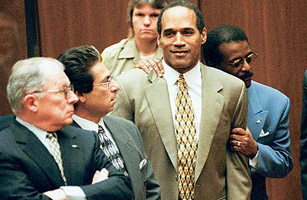
Simpson and his lawyers during the not-guilty verdict.
Oct. 3, 1995
What Americans had in common that day was that we stopped using the phone for a few minutes: according to AT&T, phone traffic dropped 60% from 10 a.m. to 10:05 a.m. P.T. In appliance stores and offices and diners, we dropped everything and watched as nine blacks, two whites and one Hispanic rendered their verdict: Orenthal James Simpson was not guilty of the murder of his ex-wife Nicole Brown Simpson and her friend Ronald Goldman. On the streets of African-American neighborhoods and the campuses of black colleges, we high-fived total strangers in jubilation. In white communities, we sat in quiet shock or vocal disgust. On radio shows, we hailed the acquittal of the black former football hero as payback for years of police racism, and we condemned the decision as a simple case of money buying freedom. At New York City's Rikers Island prison, we broke into applause, guards and inmates alike. In the Harriet Tubman battered women's shelter in Minneapolis, Minn., we cried. Later, on the TV news, we watched each other watching, and soon that watching became the bigger news, for it taught us what else we had in common. We, each of us, could not believe the other side could feel the way it did. We realized that we were not, in fact, "we."